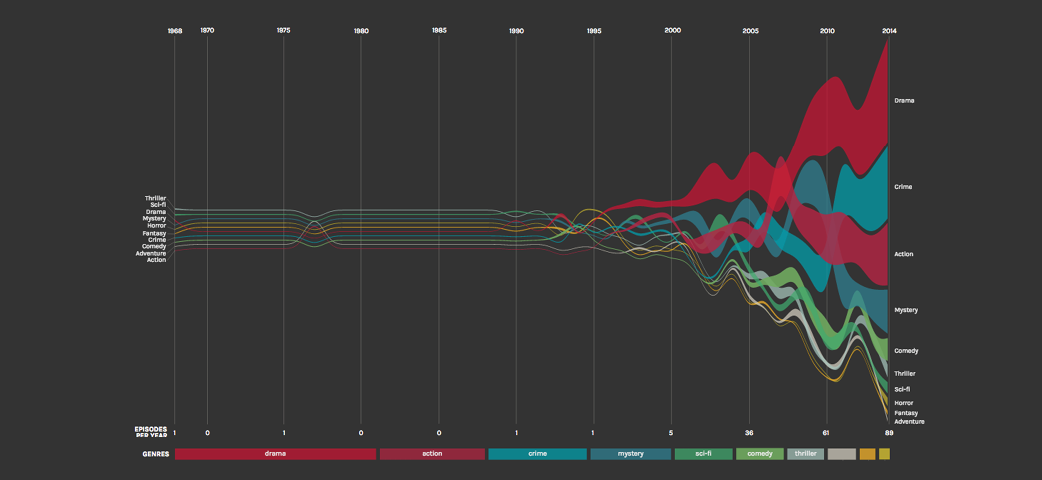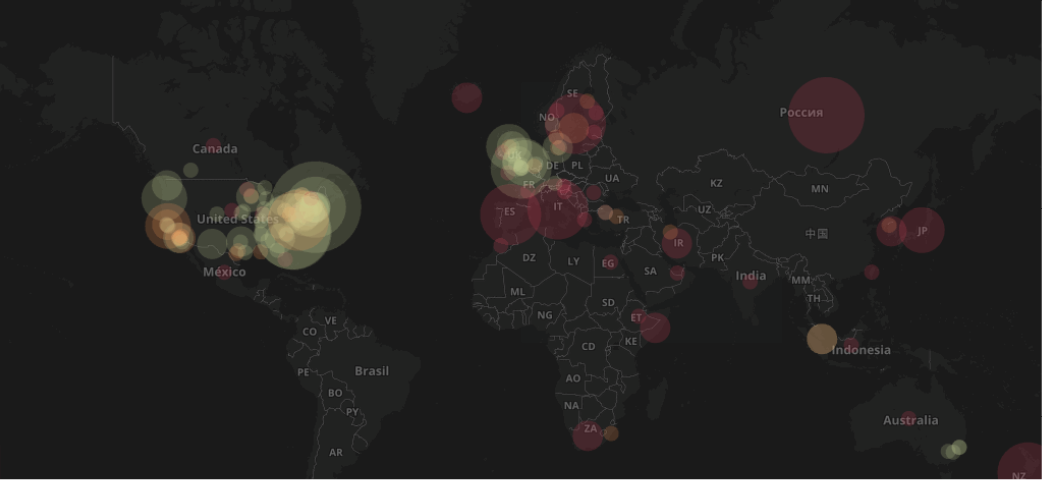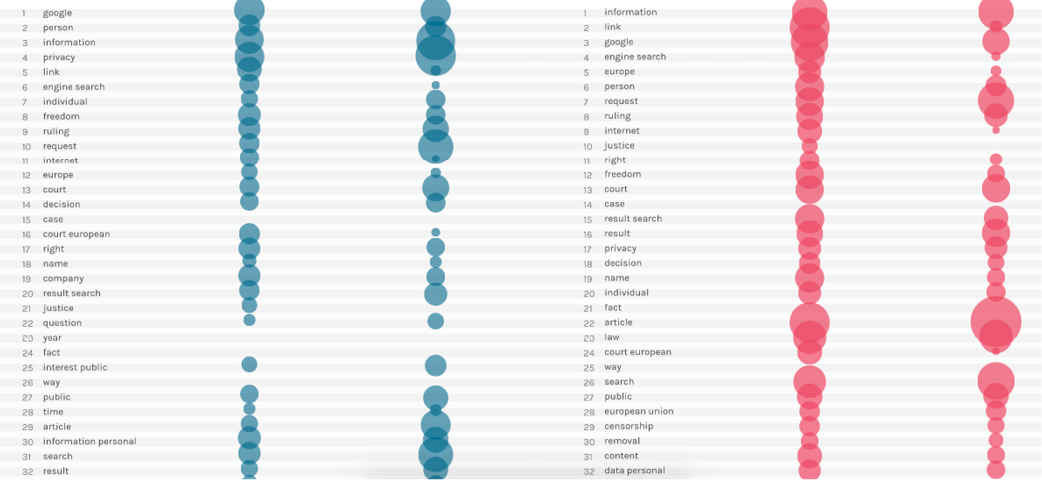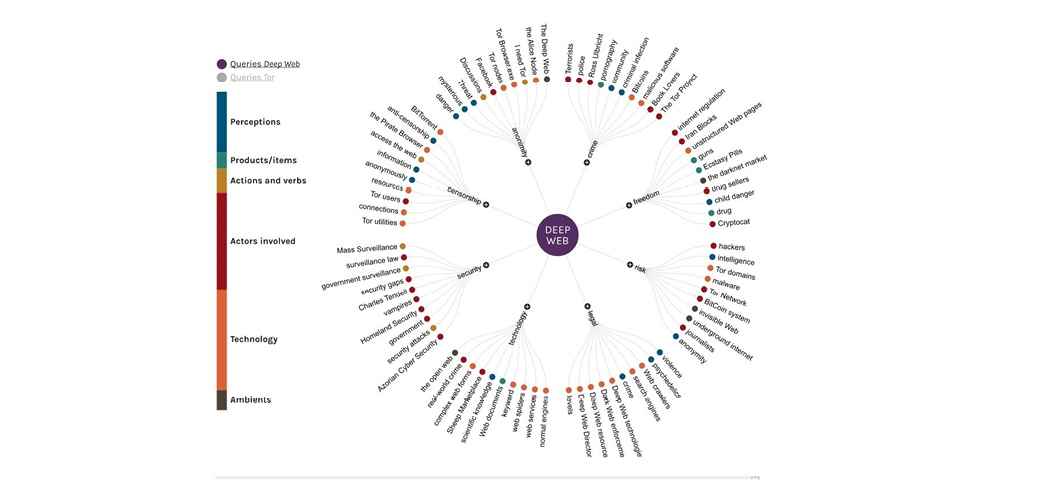the web
the data
& myself
Controversies on the Web

In the second part of the course, students identified a specific issue, related to digital technologies, that is raising a public debate over it, able to mobilize different groups and interests. This time students were asked to use the web as source: adopting approaches identified by the DMI, they identified places on the medium suitable for the debate analysis. They had to understand its logics, and find a way to collect data on their topic.
The result is two folded: on one side, students created a digital visual report explaining their exploration, describing methods, tools and issues found in their analysis. The second output is an interactive website aimed at the explanation of their findings to a wider public.
Web Personalization
What we know online emerges from a sea of data, and it does not always follow logical random. The web is constantly expanding, data are still rising and to navigate efficiently in this sea of information it was created a tool called “Web Personalization”. Around this theme a heated debate has taken place. The two actors are the main companies on one hand and academia on the other hand; these two speakers have a different perception of the problem related to the web personalization. The company is more interested in ethical problems, the academy cares more about technological ones. The development of the tool is proceeding mainly in the technology direction, neglecting the most relevant aspects for the society, which fails to make appropriate proposals.
Francesco Padovani, Lucia Pellegrini, Elisa Riva, Rodolfo Riva, Marco Saporiti, Irene Tribuzio
Digital Addiction
When we talk about addictions caused by the Internet and generally technology overuse, we are dealing with a huge topic. If a few years ago Digital Detox was just a claim people could barely rumor about, today it has been confirmed as a reality. This is certainly the reason why more and more people are keen to pay for a detoxication. You can check it yourself. Just google Digital Detox and see the first results coming up: they all suggest different solutions to unplug yourself from the Internet. Either if you feel like going on a tech-free holiday, chill at home reading a self-help book or fiddle about with a detox app freshly downloaded, Digital Detox remedies do exist and they can help you transforming your digital habits and think outside the screen.
Nicolò Arena, Claudio Fabbro, Alessandro Malcotti, Marta Mandile, Anita Righetto
Online Anonymity
Anonymity has always been a form of protection for the freedom of expression, and it is defended by the First Amendment of the US and from other human rights declarations. Nevertheless, in the Internet society, anonymity has a negative connotation in the collective imaginary, as we discovered exploring different domains of Google Images. Moreover the main and most used social networks require real identity to their online users or ask them to log-in through the main real-identity social networks, strengthening the negative perception of anonymity. But we should not forget those minorities that need to speak anonymously in order to avoid discrimination and harassment. Without anonymity how could they freely express themselves?
Luca Alberton, Marta Ambrosetti, Giulia De Rossi, Cecilia Della Longa, Valeria Quircio
Net Neutrality
It’s been quite of an year for Net Neutrality, defined by Tim Wu as «the principle that Internet service providers and governments should treat all data on the Internet equally». The ongoing discussion in the US involved Politicians, Media, Activists, Content Providers and Internet Service Providers expressing their own different positions. By analyzing the debate we found out that there are two ways of talking of the subject. Some take a technical approach, others use high-impact ethical terms: defense of the Open Internet, fear of two speed Internet, right of an Open Internet. These are very strong topics but the actual cornerstone is strictly connected to economic issues, an aspect which is often pushed into the background during the debate.
Nicoletta Bruno, Martina Cocco, Sara Perozzi, Jacopo Pompilii, Andrea Tagliabue
Mass Surveillance
The National Security Agency ensures the public safety, but who filters reality is also likely to influence it. The National Security Agency is an organization which aims to safeguard US security by controlling massive communications. The collective imagination concerning this organization is built and influenced by two main performers: the TV series picture the NSA as a symbol of protection, focusing on the word "security", especially after the September 11, 2001; on the other hand journalists talk about NSA referring to the "mass surveillance" as a violation of rights and a practice to stop permanently. The readers are urged to be aware of how these two opposing narratives can filter the reality and influence their perception.
Marianna Caserta, Francesca Casnati, Chiara Cingottini, Giulia Sonzogni, Ilaria Tedoldi
File Sharing And Piracy
Against the law but often in favor of the masses: journey through the good causes of hackers. "The piracy legacy" tells about online piracy phenomena and describes the most important stages of its history, since 1998, when it was declared illegal, until now. The website explains how the fight against piracy has always been carried out by a cohesive group of majors and associations who, strengthened by the legality of their cause, fought together against individual pirates that keep on renewing themselves. However ,analyzing the phenomenon, you realize how piracy has been the response to the user's needs and how, over time, those who are fighting pirates have started offering legal services that look very similar to those offered by the pirates.
Francesco Bianchi, Luca Bonfanti, Luca Ferrario, Roberta Rosina, Giulia Zoccarato
Right To Be Forgotten
A research shows what happen when we ask to remove information about us from web. This project is the final output of a research project on the topic of the right to be forgotten. Using the metaphor of the detergent, the website tells what this law is about and how the process of removal of information from the Web works. The right to be forgotten can remove from search engines certain information considered by the concerned person "inadequate or irrelevant". In the final part of the navigation we focus on the main findings of the research process: whether the request for de-indexation is accepted or not by Google, it may occur that this request enters the public interest, generating attention and publicity, and thus achieving the opposite result.
Roberto Catanese, Daniele De Pietri, Enrica Lo Cicero, Ludovica Lorenzelli, Cecilia Nuñez
The Deep Web
The Deep Web is the portion of the World Wide Web that is not indexed by standard search engines: we worked on the portion that is browsable by the Tor Browser. The analysis show that the theme is connected with the freedom of information and fight against censorship in contrast with mass surveillance and fight against crime. This outlines two macro areas of beliefs in which the actors of the controversy are located: who supports Tor’s legitimacy and who sees danger in the freedom it sponsors. Our narration began in showing the dark imaginary people have about Deep Web, then show what changes when people start searching for the topic with more awareness, with specific terms as queries, like Tor. We can see that knowledge brings a change of perception.
Alessio Candido, Susanna Castelli, Marco Colombo, Agnese Cunsolo, Giorgia Volinia


















